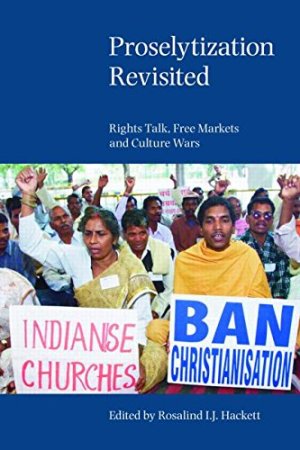 The act of converting people to certain beliefs or values is highly controversial in today’s postcolonial, multicultural world. Proselytization has been viewed by some as an aggressive act of political domination. Those controversies call for comparative, cross-cultural and multidisciplinary research. Upon the initiative of Rosalind Hackett, a symposium was organized at the 19th World Congress of the International Association for the History of Religions (IAHR) in Tokyo in March 2005. This was followed by more sessions at the conferences of the American Academy of Religion (AAR) and of the American Anthropological Association (AAA) in 2007.
The act of converting people to certain beliefs or values is highly controversial in today’s postcolonial, multicultural world. Proselytization has been viewed by some as an aggressive act of political domination. Those controversies call for comparative, cross-cultural and multidisciplinary research. Upon the initiative of Rosalind Hackett, a symposium was organized at the 19th World Congress of the International Association for the History of Religions (IAHR) in Tokyo in March 2005. This was followed by more sessions at the conferences of the American Academy of Religion (AAR) and of the American Anthropological Association (AAA) in 2007.
One of the results of those efforts has been a book edited by Rosalind Hackett. Including chapters by twenty scholars (including several young researchers), Proselytization Revisited: Rights Talk, Free Markets and Culture Wars (Equinox, 2008) offers an overview of the many arguments for and against proselytization in different regions and contexts.
Why “proselytization” rather than “proselytism”? Rosalind Hackett has explained this choice in her introductory chapter:
“Despite the interconnections, it was felt that the emphasis on ‘proselytization’ called for greater attention to the process rather than the product, the means more than the end. In other words, the possible religious conversion (an event of personal, spiritual transformation) was often less important for generating conflicts than the forms of expression, transmission, and behavior deployed to this end. We considered that the latter was the area where more changes and backlash were observable.”
In a chapter offering an “overview and comparative perspective”, Jean-François Mayer has attempted to identify frequent patterns across places. He has summarized his observations, based on many years of research on religious movements around the world, in the form of six theses, which are explained and illustrated:
- Conflicts over missionary activities are likely to increase, due to the current forces of globalization. In the long term, however, missionary activities might also lead to an increased acceptance of pluralism.
- Proselytism can reinforce images of a clash of civilizations.
- Proselytism is not just seen as a way of spreading religious ideas: it is often perceived as an attempt to extend ideological influence and political dominance.
- Where there are conflicts over proselytism, missionary activities are often understood or presented as a threat not so much to religion as to national interests.
- Groups and people critical of proselytism tend to distinguish the issue from religious freedom, which they usually profess to accept in principle.
- Conflicts over proselytism foster change and encourage the creation of new strategies and organizations among religious groups targeted by missionaries.
Since it is impossible to summarize each chapter of this book – which belongs anyway to the library of any institution or person interested in this topic – here is the table of contents:
- Revisiting proselytization in the context of rights talk, free markets and culture wars / Rosalind I. Hackett
- Conflicts over proselytization: An overview and comparative perspective / Jean-François Mayer
- Conversion of the world: Proselytization in India and the universalization of Christianity / Jacob De Roover and Sarah Claerhout
- The logic of anti-proselytization, revisited / Grace Kao
- The changing face of Christian proselytization: New actors from the global South / Paul Freston
- Muslim Apostasy, Christian conversion, and religious freedom in Egypt / Heather J. Sharkey
- Seeing is more than believing: Posters and proselytization in Nigeria / F.-K. Asonzeh Ukah
- Buddhism and the politics of conversion in Sri Lanka / Steve C. Berkwitz
- Merit and the search for inner peace: the discourses and technology of Dhammakaya proselytization / Rachelle M. Scott
- Asia’s Antioch: Evangelical Christianity and proselytism in Singapore / Jean DeBernardi
- False consciousness and the jargon of Authenticity: Religion and nationalism in the Christianised Lowland Philippines / Paul-François Tremlett
- Salvation through secular protest: the development of Falun Gong proselytization / Patsy Rahn
- The social and legal context of proselytization in contemporary Japanese religions / Mark Mullins
- Negotiating proselytism in 21st century Russia / Olga Kazmina
- Between Da’wa and mission: Turkish Islamic movements in the Turkic world (Central Asia and the Caucasus) / Bayram Balcı
- Spiritual Wars in the 10-40 window: Korean proselytism among Russia’s Asian minorities / Julia S. Kovalchuk
- Proselytization or information? Wicca and the internet / Shawn Arthur
- You can’t talk to an empty stomach: Faith-based activism, Holistic Evangelism, and the publicity of Evangelical engagement / Ormri Elisha
- Proselytization: Closing thoughts from a sociologist / James T. Richardson
Rosalind Hackett (ed.), Proselytization Revisited: Rights Talk, Free Markets and Culture Wars, London / Oakville, 2008, XIV+480 p.
